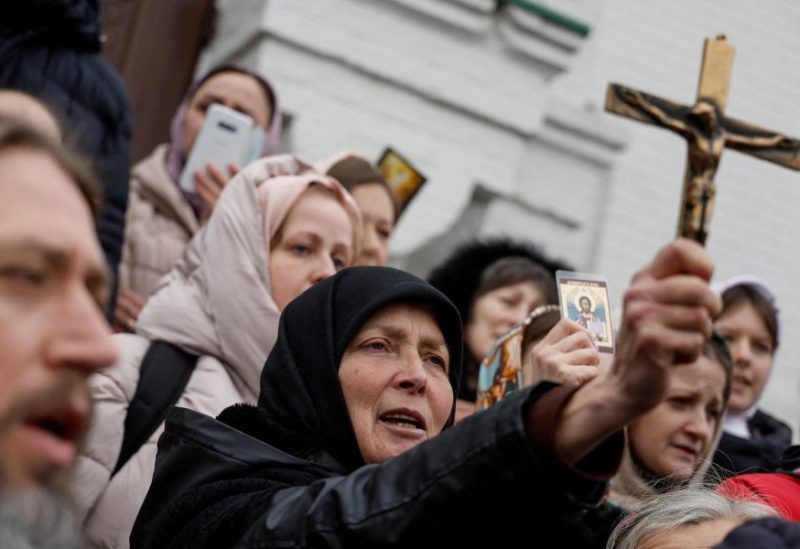
Believers of the Ukrainian Orthodox Church, accused of being linked to Moscow, pray while they block an entrance to a church at a compound of the Kyiv Pechersk Lavra monastery, amid Russia's attack on Ukraine, in Kyiv, Ukraine March 31, 2023. REUTERS/Valentyn Ogirenko/File Photo
After Kyiv accused the minority Ukrainian Orthodox Church (UOC) of working with Russia after the invasion last year, the Ukrainian parliament gave preliminary approval to a law that would outlaw the UOC on Thursday.
The UOC claims it is no longer affiliated with the Russian Orthodox Church despite having historical ties to Moscow. The draft bill would be unlawful, it claims, and it refutes Kyiv’s assertions.
Most Ukrainian Christians are members of the Orthodox Church of Ukraine (OCU), formed from two churches independent of Moscow in 2018.
By contrast, the UOC flock in Ukraine has shrunk to 4% of the population from 18% before Russia’s February 2022 invasion, according to polling by the Kyiv International Institute of Sociology.
Yaroslav Zheleznyak, a member of parliament, said on the Telegram messaging app that deputies had voted to support the bill in its first reading. It has to be backed in a second reading and approved by the president to go in to force.
The law would ban the activities of religious organisations affiliated with centres of influence “in a state that carries out armed aggression against Ukraine”, and such activities could be terminated by a court of law.
Another lawmaker, Iryna Herashchenko, said the vote was a step towards removing “Moscow priests from the Ukrainian land”.
The head of Russia’s Orthodox Church, Patriarch Kirill, appealed to Orthodox and other churches to do what they could to stop Ukraine’s action before the bill became law.
“I ask you to take all measures to prevent the continuation of the mass infringements of religious rights of the Ukrainian Orthodox Church,” Kirill said in the appeal, which appeared on a church website. It was also addressed to U.N. Secretary General Antonio Guterres and other figures.
The UOC said the draft law, one of several similar bills registered in parliament, did not comply with the European Convention on Human Rights or Ukraine’s constitution.
Describing itself as an “independent and separate church”, the UOC accused Kyiv of trying to pass it off as affiliated with the Russian Orthodox Church and portraying its Ukrainian clergymen and believers as “agents of the Russian Federation”.
Ukrainian authorities and many people in Ukraine had for years seen the UOC as loyal to Moscow, and cracked down on the church after Russia’s February 2022 invasion. Tensions have surfaced across the country.
A government commission has ruled the UOC is still canonically linked to Russia despite the church declaring that it cut ties with the Russian Orthodox Church in May 2022.
UOC Metropolitan Pavlo has been notified he is suspected of inciting inter-religious hatred and distributing materials justifying Russian aggression. He has denied the accusations.
Ukraine’s Security Service said on Thursday 68 criminal cases, including accusations of treason, had been initiated against UOC representatives since Russia’s invasion.
Analyst Volodymyr Fesenko said a ban on the UOC could be challenged in Ukraine and at the European Court of Human Rights. Fesenko suggested the church could register as a new entity with “no reference whatsoever to canonical ties” with Russia.